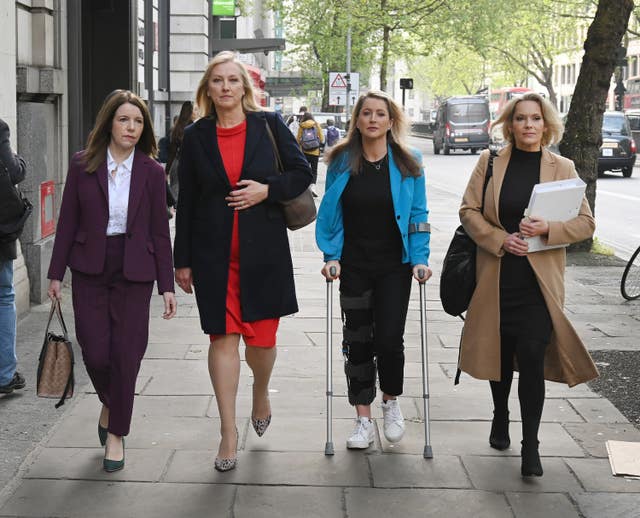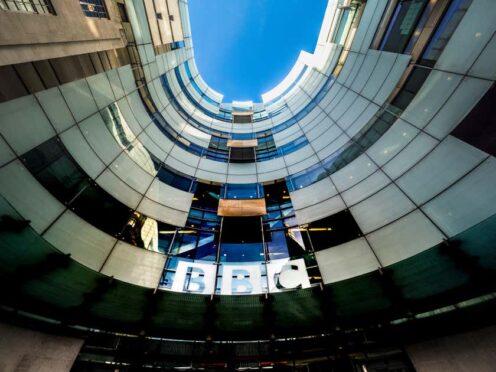Four senior female BBC journalists have begun legal action against the broadcaster claiming a job application process was “rigged”.
Martine Croxall, Karin Giannone, Kasia Madera and Annita McVeigh launched an employment tribunal against the BBC, alleging they were snubbed over chief presenter roles following the merger of the BBC’s News and World News channels.
The women, who are aged 48-55 and familiar faces on the BBC’s news channel and news bulletins, claim they have suffered age and sex discrimination after the reorganisation of the BBC’s two TV news channels that was announced in July 2022.
The group said they had previously reached pay settlements with the BBC. Ms Croxall told the hearing that “the BBC grinds you down” when it comes to pay claims.
They attended a preliminary hearing at the Central London Employment tribunal, after having originally launched the claim with a fifth journalist who is no longer part of the proceedings.
In their witness statements, which appear to be similar, the women said: “I am one of five female chief presenters with BBC News, aged 48 to 54, at the time of the detriments, who have suffered (direct/indirect) discrimination on the grounds of age and sex victimisation for union rep activities, victimisation for carrying out protected acts (bringing equal pay claims), harassment (violation of dignity, creation of a hostile, degrading, intimidating environment in the workplace, causing us to suffer ill-health and reputational damage).
“This was because of a sham recruitment exercise where our jobs were closed even though the redundancies were not genuine as the work still exists.”
The BBC is resisting the women’s legal claim in which they allege they lost their jobs and were kept off air for a year when they challenged the process.

The women alleged they have been left to suffer victimisation, harassment and reputational damage.
Their witness statements add: “Four of us have been demoted, three are facing a sizeable pay cut, with a fourth having had her pay cut for half of her job.
“No men and no women younger than us suffered these detriments.”
The women applied for the new roles as BBC News chief presenters but lost out to successful applicants including Matthew Amroliwala.
In their tribunal claim, the women said that a manager had told union reps in consultation meetings that new lower paid correspondent-presenter jobs were intended as development opportunities, meaning they were for people with less experience than them.
They also said that the cuts have left the new channel understaffed and that director-general Tim Davie had said publicly on several occasions he wanted far fewer presenters.
The women believed they have not been paid equally compared with their male counterparts since February 2020 and there was a gap of about £36,000 a year in pensionable salary as of February 2023.
They described themselves as having been “set up to fail in the jobs process” which saw them being denied work while less experienced freelancers and casuals have covered shifts they could have done.
Being kept off the air happened against their will and took place amid press and social media speculation about their futures to which they had right of reply, they added.
The stress of the “bogus” process, a year of uncertainty and publicity about their careers has caused distress and has affected their health, they said. The BBC has denied the claims.
Ms Croxall, who has worked for the BBC since October 1991, has been a chief presenter with the BBC News Channel and BBC World News since 2001. She has also appeared on BBC One network news bulletins.
Ms Madera has worked for the BBC since July 2022. Since March 2012, she has been a chief presenter with the BBC News Channel and BBC World News and also appeared on BBC1 network news bulletins.
She described her work as “a huge part of who I am and I am very proud to work for BBC News”.
Ms McVeigh, who has worked for the BBC since October 1995, has been a chief presenter with the BBC News Channel and BBC World News, since 2006. She has also appeared on BBC network news.
Ms Giannone starting working for the BBC in January 2005. She became a permanent staff member in April 2008 and has been a chief presenter on BBC World News and the BBC News Channel.
A decision has yet to be made on whether the women can make a claim on equal pay.
The BBC insists its application process was “rigorous and fair” and it is understood the broadcaster disputes the validity of the equal pay claim.
The two-day preliminary hearing, which is laying out the groundwork for a full tribunal against the corporation, was adjourned to Thursday at 10am.
